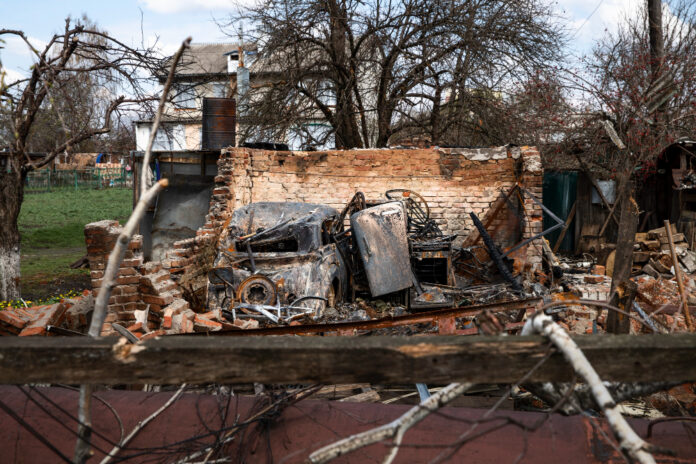Deadly strikes in Ukraine’s major cities prompt urgent appeals from President Zelenskiy amid escalating conflict
Russia has escalated its military offensive in Ukraine, targeting civilian areas in Kharkiv and Kyiv with devastating consequences. In Kharkiv, a Russian strike on a post office resulted in one fatality, identified as an employee, and left nine others injured, including a baby. Oleg Synegubov, head of Kharkiv’s regional administration, reported the casualties via Telegram, highlighting the ongoing vulnerability of Ukraine’s second-largest city despite sporadic decreases in attacks following US authorization for Ukrainian use of American weapons against specific Russian targets.
Meanwhile, in Kyiv’s Obolon suburb, a 14-storey apartment building was set ablaze by falling missile fragments from another Russian strike. Emergency services responded swiftly, treating five female residents for stress and evacuating ten others. The incident underscores the indiscriminate nature of Russian bombardment, causing civilian casualties and extensive property damage.
Embed from Getty ImagesOutside Kyiv, missile fragments also caused injuries and damage, according to the head of the military administration of Kyiv region, although specific details were not disclosed. The intensifying attacks have extended to eastern Ukraine, particularly in Toretsk, where Ukrainian military drone footage has captured distressing scenes of apparent civilian casualties amid heavy Russian bombardment. Rescue efforts have been ramped up as Ukrainian authorities contend with the aftermath of powerful Russian glide bomb deployments in the region. Glide bombs, equipped with precision guidance systems, have been launched from aircraft beyond the reach of conventional air defenses, exacerbating the humanitarian crisis.
President Volodymyr Zelenskiy condemned Russia’s use of over 800 glide bombs in the past week alone, emphasizing the urgent need for advanced weaponry to counter Russian aerial assaults. In a poignant appeal via Telegram, Zelenskiy urged the international community to expedite military support to neutralize Russian combat aircraft and target military infrastructure, thereby hastening the path to peace through defensive measures.
In a parallel development with potential geopolitical implications, Bulgaria’s Orthodox Church elected Metropolitan Daniil as its new leader, a figure viewed by experts as pro-Russian within a traditionally Moscow-aligned institution. Daniil’s prior support for the Kremlin articulated in a significant video message in 2023, suggests a continuation of close ties between the Bulgarian Orthodox Church and Russian interests, influencing Bulgaria’s ecclesiastical direction amidst regional tensions.
Analysis:
Political Perspective: From a political standpoint, Russia’s intensified military campaign in Ukraine signifies a strategic escalation aimed at exerting pressure on Ukrainian defences and undermining stability in major urban centres. The sustained attacks on civilian infrastructure, including residential buildings and essential services like post offices, demonstrate Russia’s disregard for international norms and humanitarian considerations. President Zelenskiy’s appeals for advanced weaponry reflect Ukraine’s reliance on international allies to bolster its defensive capabilities against Russian aggression. The election of Metropolitan Daniil in Bulgaria’s Orthodox Church, perceived as pro-Russian, underscores the complex interplay between religious institutions and geopolitical alignments in Eastern Europe.
Social Perspective: Socially, the escalating conflict has inflicted profound humanitarian consequences, with civilian casualties and mass evacuations underscoring the plight of Ukrainian communities caught in the crossfire. The targeting of residential areas and the deployment of powerful glide bombs exacerbate civilian suffering and heighten fears of further escalation. The resilience of Ukrainian society in the face of relentless attacks reflects a united front against external aggression, galvanizing support for defensive measures and international intervention to safeguard civilian lives and uphold national sovereignty.
Economic Perspective: Economically, the conflict in Ukraine threatens regional stability and disrupts economic activities, particularly in major urban centres like Kyiv and Kharkiv. The destruction of infrastructure and displacement of populations strain resources and hinder economic recovery efforts, compounding existing challenges posed by geopolitical tensions and sanctions. The need for humanitarian aid and reconstruction funding becomes increasingly urgent as Ukraine grapples with the aftermath of Russian military operations, highlighting the interconnectedness of security and economic stability in conflict-affected regions.
Racial Perspective: From a racial standpoint, the conflict in Ukraine does not primarily revolve around racial divisions but rather centres on geopolitical rivalries and national identities within Eastern Europe. The targeting of Ukrainian cities and towns by Russian forces underscores tensions rooted in historical, cultural, and territorial disputes rather than racial animosities. However, the humanitarian impact disproportionately affects civilian populations, regardless of ethnic background, highlighting the indiscriminate nature of armed conflict and its profound humanitarian toll on diverse communities across Ukraine.
Gender Perspective: Gender dynamics within the context of the Ukrainian conflict are shaped by broader societal impacts rather than distinct gender-specific issues. Women, men, and children alike face the immediate threats posed by Russian military operations, including displacement, injury, and loss of life. The humanitarian response prioritizes the protection of vulnerable populations, emphasizing inclusive strategies to mitigate gender-based violence and ensure equitable access to humanitarian assistance. The role of women in conflict resolution and peacebuilding remains pivotal, underscoring the need for inclusive dialogue and gender-sensitive approaches to address the multifaceted challenges arising from the ongoing crisis in Ukraine.
